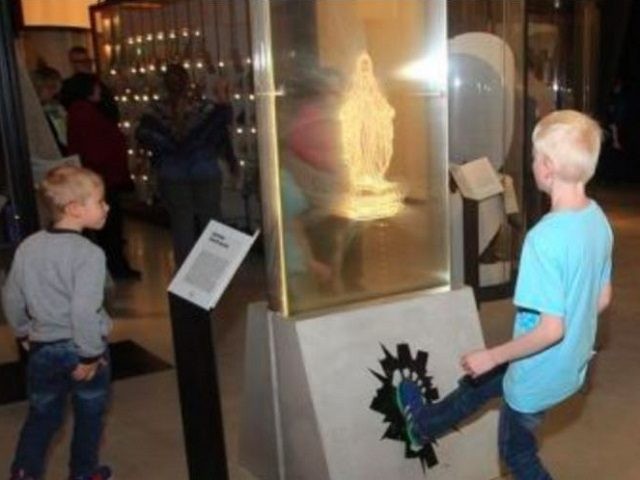The new National Museum of Estonia features an exhibit that invites visitors to desecrate a virtual image of the Virgin Mary, in celebration of the Protestant Reformation in the historically Lutheran nation.
A virtual image of Our Lady of Graces is projected onto a screen in a glass box. The image remains static until a visitor kicks a spot marked out on the plinth of the display. Once this area is kicked the image of Mary shatters into pieces and is replaced by the word “Reformation.” The exhibit then “resets” to the image of the Virgin Mary again, until the next visitor comes forward to kick it.
The Museum was inaugurated on the 29th September 2016 by the President of Estonia and the exhibit itself forms part of area that covers the history of the Reformation in Estonia.
This desecration of a sacred image has led to protests from Christian leaders and politicians in Estonia, who claim that the display mocks religion.
The Archbishop of the Estonian Evangelical Lutheran Church, Urmas Viilma, said the exhibit ridicules religion and insults the feelings of believers. He wrote on Facebook:
“I very seriously doubt that this exhibit is suitable for the permanent collection of the National Museum of Estonia, even if it is interesting from a technical point of view or from the perspective of modern approach to the depiction of historical events.”
He further noted that for a “huge number of believers,” the Virgin Mary is “not some historical figure or event, gone into oblivion, but a reality today.”
“The ridicule was an insult to the feelings of believers,” he wrote.
Political figures have also come forward to complain of the exhibit. Mart Helme, chairman of the opposition Conservative People’s Party and former ambassador to Russia, said that desecration of an image of the Virgin Mary also offends the Russian-speaking community of Estonia who have a strong devotion to the Virgin Mary.
“Most Russians living in Estonia are actively religious people and their integration is not helped by religious insult approved on a state level,” Helme said, noting that the display “insults the feelings of religious Russian-speaking residents and hinders their integration.”
“Mocking the symbols of faith also has a political dimension to it,” Helme added. “An attack on symbols may lead to an escalation of social tensions and a cooling of inter-state relations.”
A former Soviet Socialist Republic, Estonia is on the border between Europe and Russia and reportedly faces rising fears of Russian expansionism following the invasion of Ukraine.
Estonia, evangelized in the 12th century and predominantly Lutheran as of the 16th century, is one of the least religious countries in world. Some two thirds of the population declares no religious affiliation whatsoever.
Follow Thomas D. Williams on Twitter Follow @tdwilliamsrome

COMMENTS
Please let us know if you're having issues with commenting.